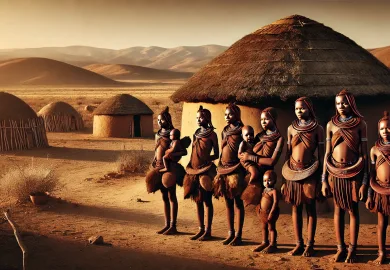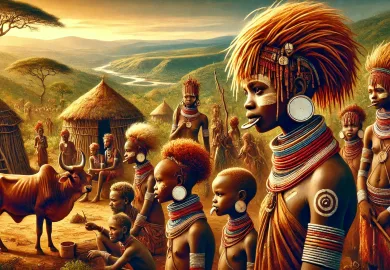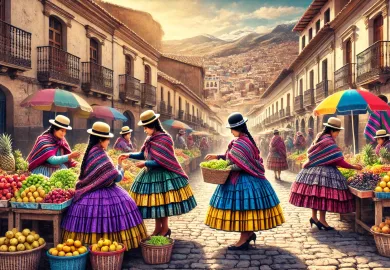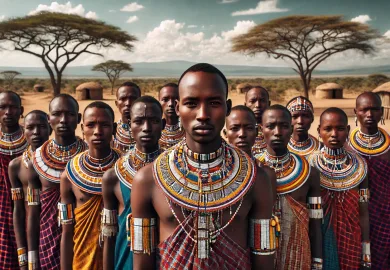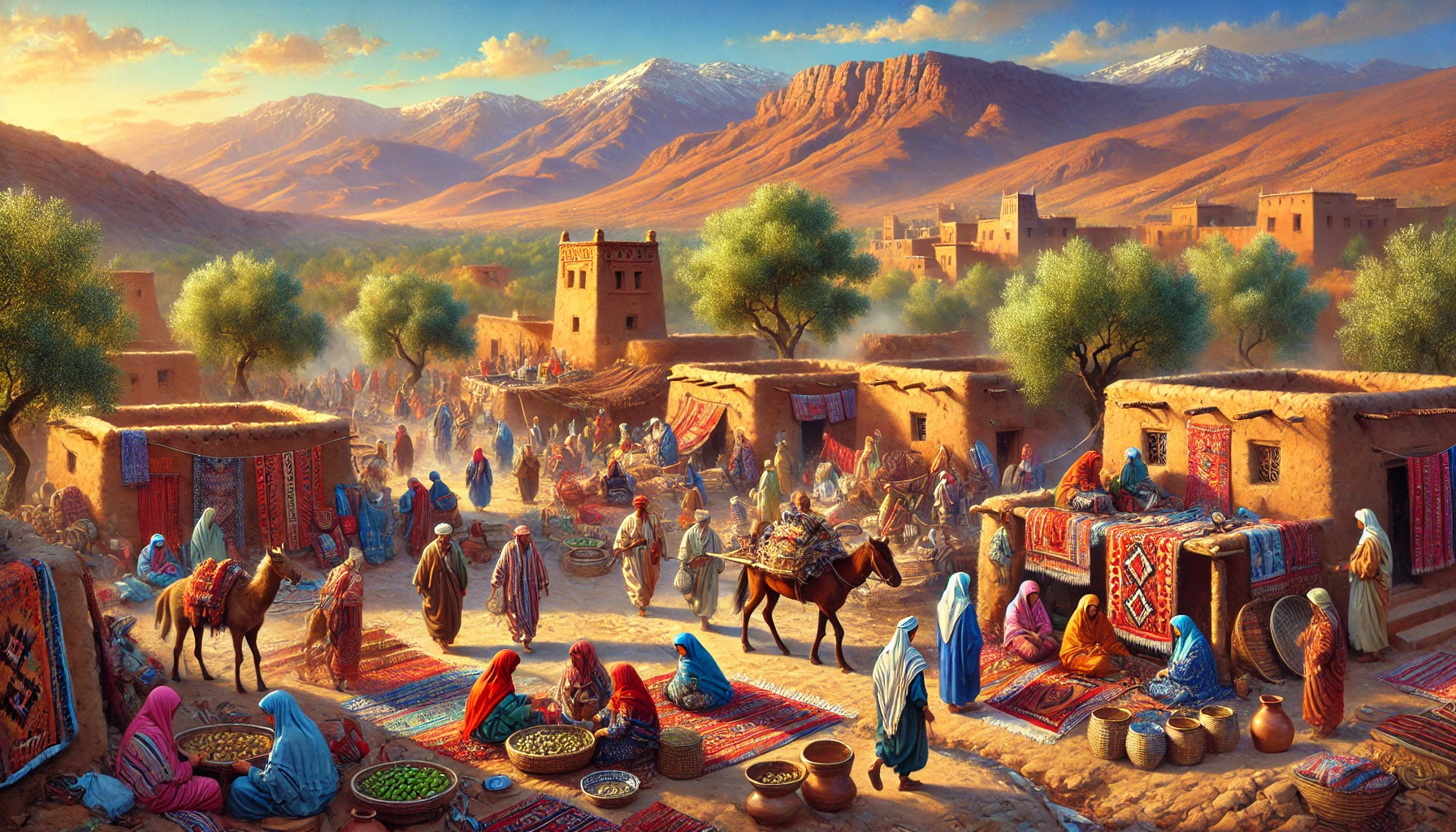
Disclaimer: This content was generated using AI. While I strive for accuracy, I encourage readers to verify important information. I use AI-generated content to increase efficiencies and to provide certain insights, but it may not reflect human expertise or opinions.
The Berber people, also known as the Amazigh, are the indigenous inhabitants of North Africa, with a history that spans thousands of years. Their vibrant culture, language, and traditions have withstood the test of time, making them a significant ethnic group within the region. As one of the oldest populations in the world, the Berbers have managed to preserve their identity despite various invasions and influences from other civilizations. In this article, we delve into the fascinating aspects of Berber culture, exploring their history, language, traditional practices, and the challenges they face today.
The History and Origins of the Berber People
The Berber people have a long and complex history that dates back to prehistoric times. Archaeological evidence suggests that the Berbers have lived in North Africa for at least 10,000 years, making them one of the oldest continuous populations in the world. Their origins can be traced to the indigenous populations of the Maghreb region, which includes modern-day Morocco, Algeria, Tunisia, Libya, and parts of Egypt and Mali.
Throughout history, the Berbers have been influenced by various civilizations, including the Phoenicians, Romans, Byzantines, Arabs, and French. Despite these influences, they have managed to maintain their unique identity and culture. The Berbers played a crucial role in the spread of Islam in North Africa during the 7th century, and many Berber dynasties, such as the Almoravids and Almohads, were instrumental in shaping the region’s history.
In addition to their historical significance, the Berbers are also known for their resistance to foreign rule. They have a long tradition of resisting colonization and defending their lands, as seen in their resistance against the Roman Empire and later against the French colonizers in the 19th and 20th centuries. This spirit of resistance is deeply ingrained in Berber culture and continues to influence their way of life today.
The Berber Language and Its Dialects
The Berber language, also known as Tamazight, is an Afroasiatic language with a rich history and a wide range of dialects. It is spoken by millions of people across North Africa, particularly in Morocco, Algeria, Tunisia, Libya, Mali, and Niger. Despite the linguistic diversity among Berber communities, the various dialects of Tamazight share a common root, making them mutually intelligible to a certain extent.
Tamazight has its own script, known as Tifinagh, which has been used by Berbers for centuries. The script has undergone several changes over time, with the modern version being used primarily in Morocco and Algeria. In recent years, there has been a resurgence of interest in preserving and promoting the Berber language, particularly in the face of Arabization and globalization.
In 2011, Tamazight was recognized as an official language in Morocco, alongside Arabic. This was a significant milestone for the Berber people, as it represented a formal acknowledgment of their cultural and linguistic heritage. In Algeria, Tamazight was also granted official language status in 2016, further solidifying its importance in the region.
Despite these advances, the Berber language still faces challenges. Many young Berbers are increasingly adopting Arabic or French as their primary language, particularly in urban areas. This shift poses a threat to the survival of Tamazight, as the language is closely tied to the Berber identity and way of life. Efforts are being made to revitalize the language through education, media, and cultural initiatives, but the future of Tamazight remains uncertain.
Traditional Berber Practices and Customs
Berber culture is rich in traditions and customs that have been passed down through generations. These practices are deeply rooted in their connection to the land, community, and spirituality. One of the most distinctive aspects of Berber culture is their traditional clothing, which varies depending on the region and occasion. Berber women are known for their brightly colored dresses, intricate jewelry, and elaborate headscarves, while men typically wear simple, yet elegant, robes known as djellabas.
Music and dance are also integral parts of Berber culture. Traditional Berber music is characterized by the use of various instruments, such as the bendir (a type of frame drum), the qraqeb (metal castanets), and the guembri (a three-stringed lute). The music is often accompanied by rhythmic clapping and chanting, creating a vibrant and lively atmosphere. Berber dances, such as the ahwash and the ahidous, are communal events that involve intricate movements and are performed during festivals and celebrations.
Another important aspect of Berber culture is their craftsmanship. The Berbers are known for their skills in weaving, pottery, and jewelry-making. Berber rugs, with their bold geometric patterns and vibrant colors, are highly prized for their quality and beauty. These rugs are often handmade by Berber women, who pass down the weaving techniques from mother to daughter. Similarly, Berber pottery and jewelry are renowned for their intricate designs and symbolic motifs, which often carry cultural and spiritual significance.
The Berbers also have a strong tradition of oral storytelling, with tales that often revolve around themes of bravery, love, and wisdom. These stories are an important part of Berber heritage and are used to teach moral lessons, preserve history, and entertain. In many Berber communities, storytelling is still a popular form of entertainment, particularly in rural areas where modern forms of media are less prevalent.
Challenges Facing the Berber People Today
Despite their rich cultural heritage, the Berber people face numerous challenges in the modern world. One of the most pressing issues is the struggle for recognition and rights within their own countries. Historically, Berbers have been marginalized and excluded from political and economic power in North Africa, with their culture and language often suppressed in favor of Arabization.
In recent decades, there has been a growing movement among Berbers to assert their identity and demand greater recognition of their rights. This has led to some positive developments, such as the official recognition of the Berber language in Morocco and Algeria, as well as increased visibility of Berber culture in the media and public life. However, these gains are often met with resistance, and many Berbers continue to face discrimination and social exclusion.
Another challenge facing the Berber people is the impact of globalization and modernization. As North Africa becomes increasingly integrated into the global economy, traditional Berber ways of life are being disrupted. Many young Berbers are leaving their rural communities in search of better opportunities in urban areas or abroad, leading to a decline in the practice of traditional customs and a weakening of community bonds.
Environmental changes also pose a threat to the Berber way of life. Climate change, desertification, and the overuse of natural resources are putting pressure on the agricultural and pastoral practices that have sustained Berber communities for centuries. As a result, many Berbers are being forced to adapt to new economic realities, often at the cost of their traditional livelihoods.
In the face of these challenges, the Berber people continue to demonstrate resilience and adaptability. Cultural preservation efforts, such as the revival of the Berber language and the promotion of traditional crafts, are helping to ensure that Berber culture remains vibrant and relevant in the modern world. At the same time, Berbers are increasingly engaging in political activism and advocacy to secure their rights and protect their heritage for future generations.
The Berber people and their culture are a testament to the enduring power of identity and tradition. Despite facing numerous challenges throughout history, they have managed to preserve their unique heritage and continue to play a vital role in the cultural landscape of North Africa. As the world becomes more interconnected, the Berber people offer valuable lessons in the importance of cultural diversity, resilience, and the preservation of indigenous knowledge and traditions.
The rich tapestry of Berber culture, with its language, customs, and history, is a source of pride for the Amazigh people and an invaluable part of the global cultural heritage. By understanding and appreciating the Berber culture, we can contribute to the ongoing efforts to protect and promote this ancient and vibrant civilization.


